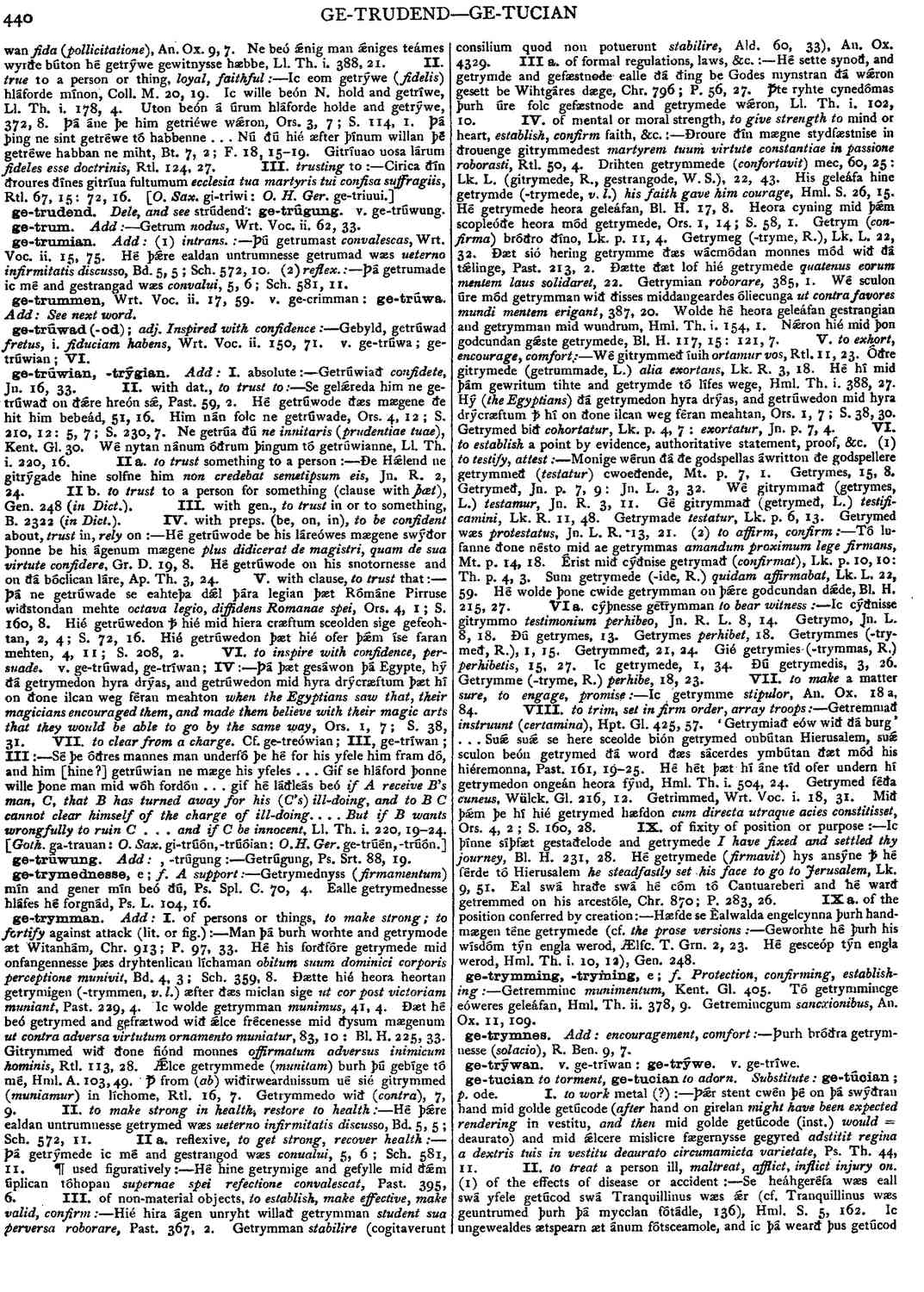ge-trúwian
- verb [ weak ]
-
Getrúwiað
confidete,
- Jn. 16, 33.
-
Se gelǽreda him ne getrúwað on ðǽre hreón sǽ,
- Past. 59, 2.
-
Hé getrúwode ðæs mægene ðe hit him bebeád,
- 51, 16.
-
Him nán folc ne getrúwade,
- Ors. 4, 12; S. 210, 12: 5, 7; S. 230, 7.
-
Ne getrúa ðú
ne innitaris (prudentiae tuae ),
- Kent. Gl. 30.
-
Wé nytan nánum óðrum þingum tó getrúwianne. Ll. Th. i. 220, 16. II a.
to trust something to a person :-- Ðe Hǽlend ne gitrýgade hine solfne him non credebat semetipsum eis, Jn. R. 2, 24. II b. to trust to a person for something (clause with þÆt ),
Gen. 248 (in Dict.).
-
Hé getrúwode be his láreówes mægene swýðor þonne be his ágenum mægene
plus didicerat de magistri, quam de sua virtute confidere.
- Gr. D. 19, 8.
-
Hé getrúwode on his snotornesse and on ðá bóclican láre,
- Ap. Th. 3, 24.
-
Þá ne getrúwade se eahteþa dǽl þára legian þæt Rómáne Pirruse wiðstondan mehte
octava legio, diffidens Romanae spei,
- Ors. 4, 1; S. 160, 8.
-
Hié getrúwedon ꝥ hié mid hiera cræftum sceolden sige gefeohtan,
- 2, 4; S. 72, 16.
-
Hié getrúwedon þæt hié ofer þǽm íse faran mehten,
- 4, 11; S. 208, 2.
-
Þá þæt gesáwon þá Egypte, hý ðá getrymedon hyra drýas, and getrúwedon mid hyra drýcræftum þæt hí on ðone ilcan weg féran meahton
when the Egyptians saw that, their magicians encouraged them, and made them believe with their magic arts that they would be able to go by the same way,
- Ors. 1, 7; S. 38, 31.
-
Sé þe óðres mannes man underfó þe hé for his yfele him fram dó, and him [hine ?] getrúwian ne mæge his yfeles ... Gif se hláford þonne wille þone man mid wóh fordón ... gif hé láðleás beó
if A receive B's man, C, that B has turned away for his (C's) ill-doing, and to B C cannot clear himself of the charge of ill-doing. ... But if B wants wrongfully to ruin C ... and if C be innocent.
- Ll. Th. i. 220, 19-24.
Bosworth, Joseph. “ge-trúwian.” In An Anglo-Saxon Dictionary Online, edited by Thomas Northcote Toller, Christ Sean, and Ondřej Tichy. Prague: Faculty of Arts, Charles University, 2014. https://bosworthtoller.com/50283.
Checked: 0